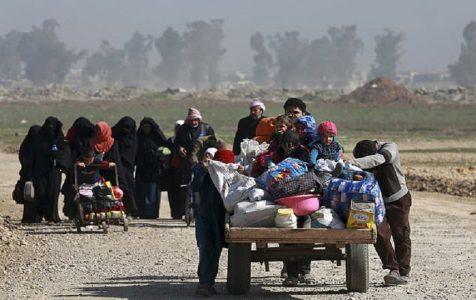
ISIS is making a comeback in Iraq with a guerrilla campaign of kidnap and killing
Iraq has seen a surge in kidnappings and killings seven months after declaring victory over Islamic State, as extremists attempt a comeback using guerrilla tactics.
In early December, Prime Minister Haider al-Abadi hailed a final victory over Islamic State after Iraqi forces swept away its last remnants from the country, three years after the militant group captured about a third of Iraq’s territory.
But, with its dream of a Caliphate in the Middle East now dead, Islamic State has switched to hit-and-run attacks aimed at undermining the government in Baghdad, according to military, intelligence and government officials.
The group was reinventing itself months before Baghdad announced in December that it had defeated it, according to intelligence officials, who said it would adopt guerrilla tactics when it could no longer hold territory.
Iraq has been experiencing an increase in kidnappings and killings, mainly in the provinces of Kirkuk, Diyala, and Salahuddin since it held an election in May.
This indicates the government will come under renewed pressure from a group that once occupied a third of the country during a three-year reign of terror.
Last month saw at least 83 cases of kidnap, murder or both in the three provinces, with most occurring on a highway connecting Baghdad to Kirkuk province.
In May, the number of such incidents in that area was 30, while in March it was seven, according to Hisham al-Hashimi, an expert on Islamic State who advises the Iraqi government.
In one incident on June 17, three Shi’ite men were kidnapped by Islamic State militants disguised as policemen at a checkpoint on the highway.
Ten days later their mutilated corpses were discovered, rigged with explosives to kill anyone who found them.
Speaking in the Shi’ite holy city of Kerbala surrounded by children wearing photos of their slain fathers around their necks, Bassem Khudair, a relative of the men, said security forces were uncooperative.
He had implored the soldiers who found the men’s bullet-ridden car to pursue the kidnappers but was refused.
‘We went alone, bearing personal responsibility, as three of our own had been taken and we couldn’t just watch,’ he said. ‘Six of us, all civilians, walked for about 10 or 12 kilometres. We found their documents scattered on the ground as we walked.’
The next day, he received a phone call from his brother. The men were alive but held by Islamic State. One of the kidnappers had said they would be executed if the government did not release all female Sunni prisoners.
The kidnapper then called Khudair daily. Khudair informed the government but none of Iraq’s intelligence agencies offered to trace the caller’s location, he said.
Ten days later, the kidnapper told Khudair the men were dead. Military commanders in the provinces of Diyala and Salahuddin ducked responsibility for retrieving the bodies.
Diyala Provincial Council Chairman Ali al-Dani said the advantage currently lay with Islamic State: ‘The terrorists now are moving in small groups that are hard to track. Intelligence work is needed.’
‘The situation is confusing, and the reason is the chaos within the security forces. There isn’t one command leading security in the province. This strengthens Daesh,’ said Salahuddin Provincial Council Chairman Ahmed al-Kareem, using a pejorative term for Islamic State.
Source: Daily Mail





